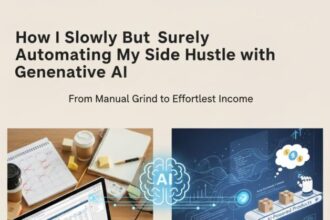Why Stocks Go Nuts (And How Not to Lose Your Mind)
I still remember the feeling. A knot in my gut. It was a company called JDS Uniphase, a dot-com star that was supposed to make me rich. And for a while, I felt like a genius. Then the floor fell out. I’d open my account and just stare at the screen, watching my money evaporate. It wasn’t just losing the cash that hurt. It was the feeling of being a complete and utter fool. The feeling that I was a pawn in a game where I didn’t even know the rules.
If that sounds familiar, this is for you.
This is the real talk about why do stock prices go up and down. Not the sanitized version you get from guys in suits, but the messy, human truth.
The Real Challenge with This Stuff Most People Won’t Tell You
The finance world feels complicated because it’s supposed to. It’s a club. The jargon is the bouncer at the door, there to make you feel like you don’t belong. It’s how they protect their turf.
But the core ideas are not that hard.
The challenge is ignoring the noise and the gatekeepers. It’s about realizing you don’t need a Ph.D. to understand what’s happening to your own money.
And once you get it, really get it, a weird sense of peace settles in. A market crash starts to feel less like a personal attack and more like a weather event. Something to be respected, maybe even taken advantage of, but not something that has to destroy you. You stop being the victim of the story and start just… reading the story. It’s a hell of a lot better.
Getting the Fundamentals Right: Your Essential Toolkit for This Madness
Forget fancy toolkits. You only need to understand that there are three main forces at play at all times. Think of it as three different stories being told at once.
The Company’s Story: Is this specific business actually doing well?
The World’s Story: What’s happening in the bigger economy?
The Crowd’s Story: What are all the other lunatics with money doing?
That’s it. Everything that happens, every crazy swing, is because of a new chapter in one of those three stories. The game is just figuring out which story is making the most noise right now.
Your Actionable, Step-by-Step Guide to Mastering This Thing
Okay, let’s break down those three stories. This isn’t a step-by-step to getting rich. It’s a step-by-step to staying sane.
The Company’s Story (The Part That’s Supposed to Make Sense)
This is about the business itself. Does it make good products? Does it have smart people in charge? And most importantly, is it making money?
Every three months, a company puts out its “earnings report.” But here’s the sick joke: the number doesn’t matter as much as the guess. Wall Street analysts—who are basically professional guessers—all put out their estimates beforehand. The company is then judged not on its own merits, but on whether it beat or missed the guess.
A company can make a billion dollars. But if the guess was for 1.1 billion, the stock gets torched.
It is the dumbest game on Earth. But it’s the game.
Then there’s “guidance.” This is when the CEO tries to predict the future. They could’ve just had the best year in history, but if they sound even a little bit nervous about the next six months, the stock will get cut in half. The market is a paranoid, forward-looking beast. It’s obsessed with what’s next. This is the core of stock market fluctuations explained.
The World’s Story (The Weather You Can’t Control)
Sometimes, it doesn’t matter how great the company is. The whole world goes crazy.
The biggest factor here is the Federal Reserve—the Fed. Think of the Fed as the guy who controls the price of money itself. He does this with interest rates.
When rates are low, money is cheap. It’s a party. Companies borrow and grow. Good times. When rates go high, money is expensive. The party’s over. Everything slows down. And suddenly, safe, boring investments look a lot better than risky stocks. Money leaves the market. This is a huge piece of how economy affects stocks.
You also have the other stuff. Inflation, which is like a slow leak in your tire, making everything worth less over time. Geopolitical crap. Wars. Pandemics. Basically, any big, scary world event that creates uncertainty. The market would rather have guaranteed bad news than uncertainty. It hates not knowing what happens next.
The Crowd’s Story (The Human Element)
This is where it all goes off the rails.
Because after all the spreadsheets and analysis, the final price is set by people. And people are a mess of fear and greed.
Greed is what creates bubbles. You see a stock going vertical. Your brain shuts off. All you feel is FOMO—Fear Of Missing Out. You have to get in. You buy. Everyone buys. The price gets completely disconnected from reality. It’s a mania.
But fear is stronger.
Fear is what causes crashes. A bad day turns into a bad week. The headlines get scary. You see red everywhere. Your neighbor sells. Your cousin sells. And that primal, lizard part of your brain starts screaming, GET OUT.
So you sell. Everyone sells. It’s a stampede for a tiny exit, and perfectly good companies get trampled along with the bad ones. Logic has left the building. This is not investing. This is a mass psychological event. And understanding what influences stock prices means understanding that sometimes, the answer is just: “mass hysteria.”
Common Mistakes I’ve Made (And I’ve Made Them All)
I didn’t learn this stuff from a book. I learned it by losing money.
I fell in love with a stock. Thought it was special. I ignored all the warning signs because I wanted the story to be true. Don’t do that. Be ruthless. A stock is not your friend.
I checked it every five minutes. This is a form of self-torture. It forces you to make emotional decisions based on meaningless noise. Just stop.
I panic-sold at the bottom. I once sold everything in a crash. Locked in a huge loss. It was a visceral, gut-wrenching decision. And it was the single stupidest financial move of my life. I watched in agony as the market recovered without me.
I bought the hype. Listened to a “hot tip” without doing any of my own thinking. That’s not investing. That’s buying a lottery ticket.
Your Path Forward: Putting This Knowledge into Action
The point here isn’t to predict the market. You can’t. The point is to diagnose it. The point is to look at a crazy market day and be able to say, “Okay, this is happening because of the Fed,” or “This is just the crowd being idiots again.”
That diagnosis is what separates a reaction from a decision.
It’s what lets you breathe.
It’s how you survive the circus without joining the clowns.
So, I’m curious. Which of those three stories—the company, the world, or the crowd—causes you the most grief? Where do you feel the most lost? Let me know in the comments. We’re all just trying to figure it out.































